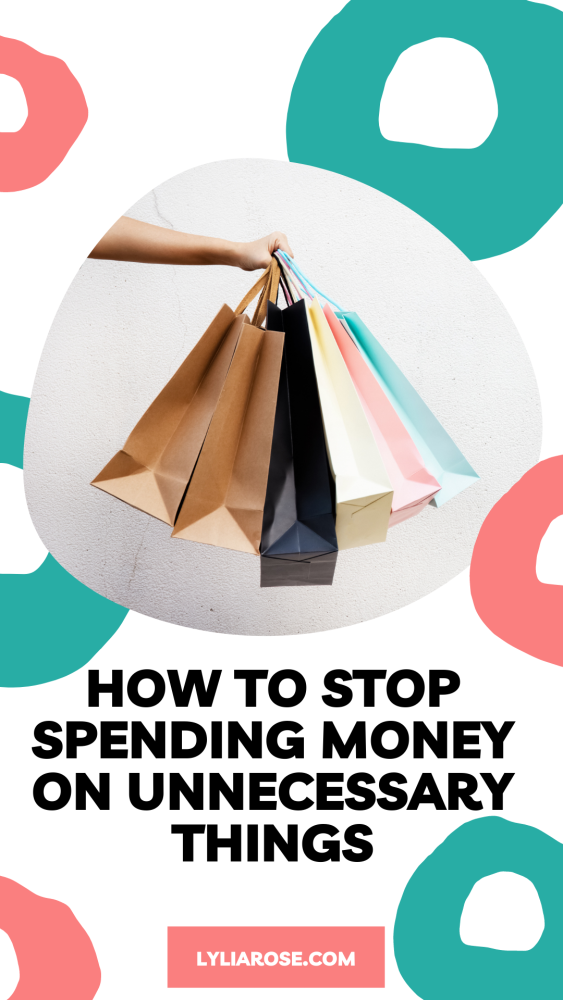How to stop unnecessary excess spending habits
Posted on
Do you find yourself spending unnecessarily?
You're not alone, but that doesn't mean you have to just live with it.
With these tips for how to stop unwanted spending, you can get in control of your money.

Why do we overspend and buy things we don’t really need?
Overspending is something we all do. Sometimes we spend more than we need and don't know how to avoid it, and sometimes we overspend because of a lack of knowledge.
One reason for overspending is peer pressure. Friends might pressure you into going to the latest bar with them, or they might invite you to expensive restaurants when you're on a budget. It's important to remember that they're not doing it maliciously. They just might earn more than you and not realise you are finding it hard to stay in budget while also having fun with friends!
So what can we do to prevent overspending?
Here are some tips to get started.
Replace bad money habits with good ones
The best way to stop a bad habit is to have a good one to replace it. Create a list of your spending habits and the replacements you'll need in order to kick the old habits.
Firstly, find out what you spend money on and create a list of categories for each expense (i.e., entertainment, clothes, food, transport). This will help you see where your money is going so you can understand your spending habits and where the unnecessary spending is.
In years past you wouldn’t be able to see your monthly expenditure until your monthly bank statement came in the post, but nowadays it’s easier than ever to access your bank statements online whenever you like. This means you can track your spending each day to stay on top of a budget. This also means it’s easy to go back through the past few weeks and see where you have spent your money.
Once you have done this, you can see where your bad money habits are and change them for better ones. For example, if you are running an expensive car or always taking private taxis then choosing public transport can greatly reduce your spending when it comes to your monthly transport costs. Or perhaps you eat at fancy restaurants and cafes every lunch time with work colleagues? Instead, choosing to take a packed lunch a few days a week can massively reduce your expenditure on food.
Small changes can make big savings. If you buy a £3 coffee every day on your way to work, you could be spending almost £800 per year! Just imagine what else you could use this money for that you might prefer. A holiday perhaps? Swap the coffee shop habit for a reusable flask full of hot coffee you make at home in the morning. That £3 you spend on one cup of coffee could buy a whole bag of organic ground coffee (fair trade too) that you can make quickly each morning before work, lasting weeks instead.
Set a healthy budget for each money category
You don’t have to totally stop all the things you love, but set a healthy budget from your disposable income each month that you don’t want to go over. If you like eating out at cafes for your work lunch break and it brings you joy, then don’t stop altogether. Allow yourself a certain budget each month for this and ensure you don’t go over. It might even make those cafe and restaurant visits more enjoyable as they are less often!
Set a limit for expenditure on things like clothes too and be strict. Ask yourself if you really need to buy more things like clothes and if you do, perhaps there are cheaper ways of obtaining them such as buying preloved on eBay or in charity shops. This will save money compared to buying new and be better for the environment. If you find you overspend regularly on clothes you don’t really need then you could set yourself a challenge of a zero spend month (or longer) on clothes. Perhaps put the money saved into that emergency fund you’ve been meaning to get started for a while now.
Avoid impulse buying by making shopping lists
Impulse buying happens when you buy something that you don’t really need or want and then regret it later because you could have used the money on something more important, such as paying your bills or saving for retirement. Make a list of what you need before going shopping so that you only buy the items on your list.
Avoid costly moods
You might buy things because of how you feel at that moment in time such as when you are happy, sad, bored, stressed, or angry. When you are feeling a particular emotion, it can be hard to think rationally about what you should do, including making purchases. One way to avoid spending money impulsively when you’re in a certain mood is by distracting yourself with something else. This could be anything from watching TV, reading a book, talking on the phone, or taking a nap.
Try using actual cash
We often think that we need to spend to keep up with the Joneses. But there are plenty of ways to reduce our spending and increase our savings.
For example, we can stop paying attention to ads and the constant urge to buy something new by trying a minimalist lifestyle. We can also try using cash and not credit cards so we don't overspend on items we don't need or want. Many people find success with the cash envelopes system whereby you allocate a set amount of actual cash to each category each month. Seeing the actual cash and it disappearing as it’s being spent can actually make you more aware of your spending and make you more careful with money. Whilst there are many smart ways to use a credit card, it can be all too easy to put things on a credit card and feel like we’re not actually paying for it.
This can be tricky post-Covid when most shops are only accepting card, so you may have to do this visually on a spreadsheet instead. Add your categories and budgets for each and make sure to deduct the amounts you have spent on each category at the end of each day. Seeing a visual representation of your money and spending habits can help to keep you on track.
Why not add a category for saving too? If you make saves on items then add the saved amount to your savings category and you’ll have a nice lump sum at the end of the month to transfer into a savings pot.
Turn your passion for spending into a passion for saving
How about switching one passion for another? Instead of being obsessed with spending, why not set yourself a target with saving and see if you can become obsessed with this instead? This will help you build your financial security for a better future too. That’s something worth obsessing over!
Turn your unnecessary spending habit into a necessary saving habit!
Or why not spend less time spending money and more time making money? Find ways to make more money from other sources such as lucrative side-hustles or investments. Start focusing on building your wealth instead of reducing it.
Understand why you overspend on unnecessary things
Being a free-spirited person is alright, but when it comes to spending money, you need to set realistic limits for yourself. Otherwise, you'll most likely spend more than you meant to. It is a human nature to want what we can't have. This is why it's so easy to overspend when the opportunity arises.
Instant gratification influences us in many ways. It's a common phenomenon that people want what they can't have and will often spend money on something they don’t need in order to get these products. Companies like Amazon, Facebook, and Instagram use instant gratification as an incentive for customers to make more purchases.
Unwanted spending is a term that describes the money that a person spends on items or services that they did not want or intend to buy. The term "unwanted spending" is a newer way of saying impulse shopping, irrational shopping, and incidental consumption. The buying of things like junk food, clothes, and other items characteristically deemed unnecessary is classified as unwanted spending.
There are a number of triggers of unwanted spending. These include:
- Stress. Spending on things can be a way to relieve stress, and this is why many people experience an uptick in their shopping habits when they are stressed.
- Boredom. Shopping can also be a form of entertainment or entertainment substitute.
- FOMO (Fear Of Missing Out). If you have the feeling that you have missed out on something, then it is likely that you'll want to go shopping in order to get it - even if the item isn't really something that you need or already have at home.
- Social Comparison. When we compare ourselves with others, we might feel as if we aren't measuring up and feel the need to buy more things to make ourselves appear comparable to others. The less you know about the triggers that make you overspend, the more likely it is that you will be a victim of a marketing ploy. And while a lot of people say they don't care what others think about them, deep down most people do.
It is not easy to address or solve a problem when one does not know what is causing it in the first place. The only way out of this is identifying what causes us to overspend in the first place and then tackling that trigger. The first step to take is to develop an awareness of what triggers these feelings of spending. Once you know the patterns, you can start implementing new actions to address them.
Conclusion: taking control of your overspending with a more consistent approach
Taking control of your overspending can be one of the most difficult things to do. The reason for this is that people often say, "I'll start tomorrow." This is a bad habit that we all have and we need to break it and start creating good money habits instead.
The first step in taking control of your overspending is to find out where you are overspending the most money and why. By following the tips above you can address why you have a habit of overspending and implement some techniques to make smarter money choices. You can begin saving more instead of spending more and work to a realistic budget whilst still doing the things you enjoy.

